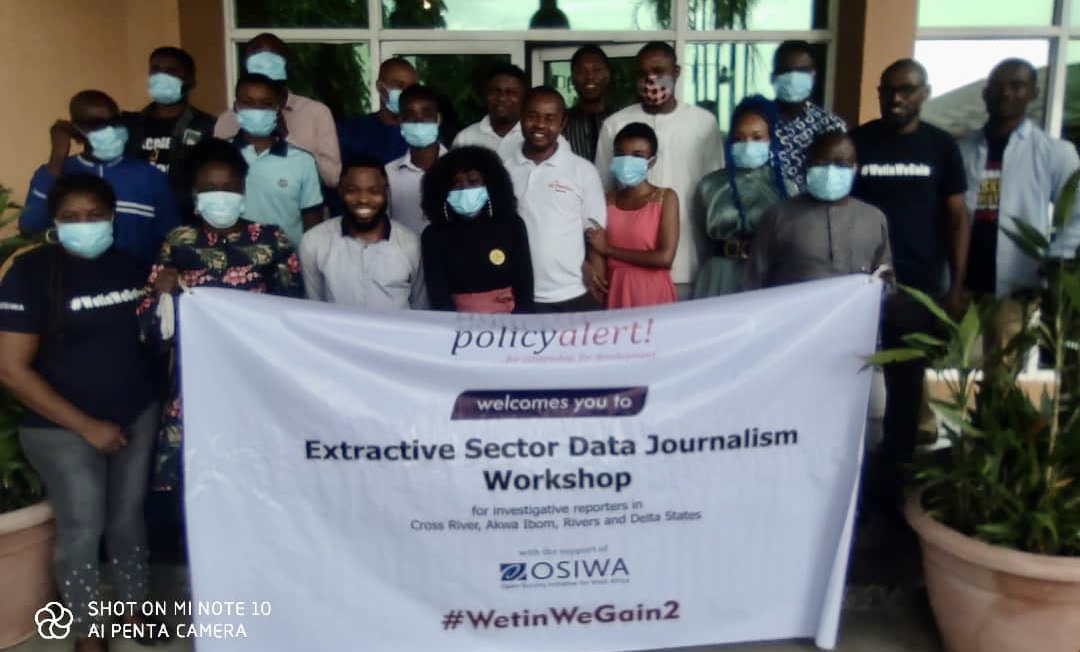By CrossRiverWatch Admin
In what seems a paradigm shift from existing norms, over a dozen journalists were on Friday in Calabar, trained on reporting in depth the extractive industries in Cross River State in a bid to promote contract transparency, beneficial ownership, accountability, and overall transparency in the sector.
The training, which had physical and virtual attendees, is part of activities for the #WetinWeGain2 campaign which directly targets journos and other civic space actors in four States — Cross River, Akwa Ibom, Rivers and Delta (CARD States).
It hopes to aid in pushing “the stakes for the disclosure and uptake of extractive sector payments, beneficial ownership, contract details as well as information on other related reforms in Nigeria’s extractive sector as tools for more effective social accountability and improved community beneficiation,” the project’s concept note prepared by PolicyAlert reads.
“We hope to see a sector that is more open and accountable especially for host communities and for people to know how much wealth has been extracted and how such wealth has been converted for the development of the host communities and others,” Tijah Bolton-Akpan, the Executive Director, PolicyAlert told journalists at the training.
He explained that the extractive sector has been the mainstay of the Nigerian economy and lamented that it has been “trapped in a cycle of corruption” such that the citizenry have not really benefitted from it despite attempts to “course correct” over the years.
“We are a direct contradiction from what you will expect to see from a country that has made billions and trillions, leading many to question whether we are suffering from the proverbial resource curse where communities that have the richest resources often tend to be the most conflict prone, inflicted with poverty and underdevelopment,” Bolton-Akpan said.
Among the efforts to correct this anomaly, Nigeria joined the global transparency initiative — the Extractive Industries Transparency Initiative (EITI) with reports published two years after each financial year disclosing figures, a situation he said has not really translated to real transparency and accountability due to the gap in utilising the data disclosed, hence the need for journalists and civil society actors to step up.
“A lot of data has been published over the years, but the challenge has always been taking up this data and utilizing it because the data itself does not really translate into accountability. So, you journalists have the responsibility to not just utilise the data by publishing it, but to educate and inform the people in order for them to understand,” he said.
The program officer, Mfon Gabriel, said the program hopes to get at least 10 reportage and op-eds on the extractive industries in the CARD States, as well as 5 investigations into the activities of the extractive industries activities and their impacts.
He averred that only few knew about the agreements, deals and contracts signed between governments and extractive industries which is a stumbling block to open governance and expressed optimism that the project will lead to a “more transparent, accountable and better managed extractive sector in Cross River State.”
Since You Are Here, Support Good JournalismCrossRiverWatch was founded on the ideals of deploying tech tools to report in an ethical manner, news, views and analysis with a narrative that ensures transparency in governance, a good society and an accountable democracy. Everyone appreciates good journalism but it costs a lot of money. Nonetheless, it cannot be sacrificed on the altar of news commercialization. Consider making a modest contribution to support CrossRiverWatch's journalism of credibility and integrity in order to ensure that all have continuous free access to our noble endeavor. CLICK HERE |
New Feature: Don't miss any of our news again.Get all our articles in your facebook chat box.Click the Facebook Messenger Icon below to subscribe now
Text Advert by CRWatch :Place Yours

Will You To Learn How To Make Millions Of Naira Making Special Creams From Your Kitchen?.Click Here
Expose Your Business And Make More Sales. Advertise On CrossRiverWatch.com Today



Leave feedback about this